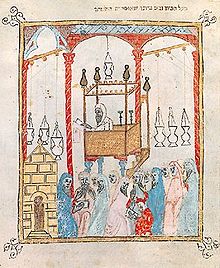
Back Alhambra-Edikt ALS مرسوم الحمراء Arabic مرسوم الحمراء ARZ Əlhambra qanunnaməsi Azerbaijani Альгамбрскі эдыкт Byelorussian Алхамбрийски декрет Bulgarian Decret de l'Alhambra Catalan Dekret z Alhambry Czech Alhambra-Edikt German Edicto de Granada Spanish

The Alhambra Decree (also known as the Edict of Expulsion; Spanish: Decreto de la Alhambra, Edicto de Granada) was an edict issued on 31 March 1492, by the joint Catholic Monarchs of Spain (Isabella I of Castile and Ferdinand II of Aragon) ordering the expulsion of practising Jews from the Crowns of Castile and Aragon and its territories and possessions by 31 July of that year.[1] The primary purpose was to eliminate the influence of practising Jews on Spain's large formerly-Jewish converso New Christian population, to ensure the latter and their descendants did not revert to Judaism. Over half of Spain's Jews had converted as a result of the religious persecution and pogroms which occurred in 1391.[2] Due to continuing attacks, around 50,000 more had converted by 1415.[3] A further number of those remaining chose to convert to avoid expulsion. As a result of the Alhambra decree and persecution in the years leading up to the expulsion of Spain's estimated 300,000 Jewish origin population, a total of over 200,000 had converted to Catholicism to remain in Spain, and between 40,000 and 100,000 remained Jewish and suffered expulsion. An unknown number of the expelled eventually succumbed to the pressures of life in exile away from formerly-Jewish relatives and networks back in Spain, and so converted to Catholicism to be allowed to return in the years following expulsion.[4]:17
In 1924, the regime of Primo de Rivera granted Spanish citizenship to a part of the Sephardic Jewish diaspora, though few people benefited from it in practice.[5] The decree was then formally and symbolically revoked on 16 December 1968 by the regime of Francisco Franco,[6] following the Second Vatican Council. This was a full century after Jews had been openly practising their religion in Spain and synagogues were once more legal places of worship under Spain's Laws of Religious Freedom.
In 2015, the government of Spain passed a law allowing dual citizenship to Jewish descendants who apply, to "compensate for shameful events in the country's past."[7] Thus, Sephardi Jews who could prove that they are the descendants of those Jews expelled from Spain because of the Alhambra Decree would "become Spaniards without leaving home or giving up their present nationality."[8][9] The Spanish law[10] expired in 2019 and new applications for Spanish citizenship on the basis of Sephardic family heritage are no longer allowed. However, the descendants of the Jews exiled from the Iberian Peninsula may still apply for Portuguese citizenship.
- ^ "The Edict of Expulsion of the Jews – 1492 Spain". www.sephardicstudies.org. Retrieved 27 June 2017.
- ^ Pérez, Joseph (2012) [2009]. Breve Historia de la Inquisición en España (in Spanish). Barcelona: Crítica. p. 17. ISBN 978-84-08-00695-4.
- ^ Gerber, Jane (1994). The Jews of Spain: A History of the Sephardic Experience. New York: The Free Press. pp. 1–144. ISBN 978-0029115749.
- ^ Pérez, Joseph (2007). History of a Tragedy: The Expulsion of the Jews from Spain. Translated by Hochroth, Lysa. University of Illinois Press. ISBN 9780252031410.
- ^ Celia Prados García: La expulsión de los judíos y el retorno de los sefardíes como nacionales españoles. Un análisis histórico-jurídico (in Spanish)
- ^ "1492 Ban on Jews Is Voided by Spain", The New York Times, 17 December 1968
- ^ "Sephardic Jews eager to apply for Spanish citizenship", Washington Post, 17 February 2014
- ^ "1492 and all that", The Economist, 22 February 2014
- ^ Stavans, Ilan (1 April 2014). "Repatriating Spain's Jews". The New York Times. ISSN 0362-4331. Retrieved 27 June 2017.
- ^ "BOE-A-2015-7045 Ley 12/2015, de 24 de junio, en materia de concesión de la nacionalidad española a los sefardíes originarios de España". pp. 52557–52564.
© MMXXIII Rich X Search. We shall prevail. All rights reserved. Rich X Search